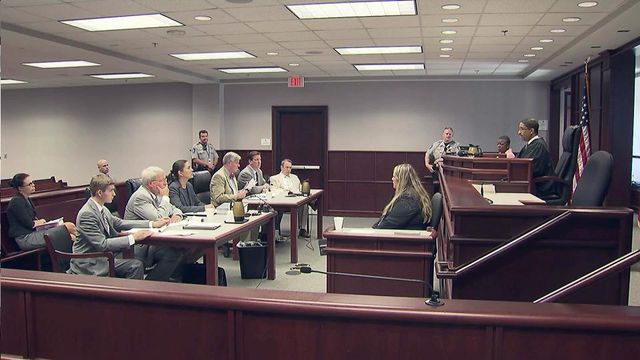Lawsuit over voter ID stalls after legislative changes
Lawyers for both sides in a state voter ID lawsuit told a Superior Court judge Monday that they need two weeks to assess how recent changes will affect a state-based challenge to North Carolina's voter ID law. A federal lawsuit is scheduled to move ahead on July 13.
Posted — UpdatedLawyers representing both a group of voters and civil rights organizations as well as lawyers defending the state and the General Assembly told Superior Court Judge Michael Morgan on Monday that they needed time to digest what a bill lawmakers sent to the governor last week will mean. The lawsuit is one of two court cases challenging North Carolina's sweeping 2013 elections law. The other is in federal court and covers a broader array of issues than the state case, which is focused on the voter ID requirement.
Under the 2013 law, all voters would have to show a current government-issued ID in order to cast a ballot. The changes made last week would allow someone with an expired driver's license or state-issued ID card to vote if it was less than four years out of date. It will also require elections officials to help someone who tries to vote without an ID during the early voting period to use a mail-in ballot, which does not require ID.
Most significantly, it allows voters who do not have an ID to sign an affidavit saying they had a "reasonable impediment" to obtaining and presenting a state-issued ID, such as conflicting work schedules, an illness or the fact that their ID was stolen.
"That is a fairly significant change to the voter ID provision, and we've not had a chance to confer with our clients," said Anita Earls, director of the Southern Coalition for Social Justice and a lawyer representing the North Carolina League of Women Voters, the A. Phillip Randolph Institute and some individual voters.
Alec Peters, a lawyer for the state Attorney General's Office, which is defending the 2013 law, called Earls' request for a delay "reasonable."
Morgan gave the two sides until July 2 to file an update on the status of the case and whether is should go forward. He said he would be unlikely to review that status report until July 13, the same week the federal case focused on the 2013 election law goes to trial.
After the court hearing Monday morning, Earls said that one of many possibilities is that the changes to the voter ID requirements could lead to North Carolina court case either being dismissed or otherwise concluded.
Still, even if her clients decide that last week's changes address problems with the state voter ID law, there could be reasons to keep pursuing a delay. For example, the State Board of Elections has been educating voters on the 2013 version of the law for two years now. Those rules are about to shift.
"Everyone who went to vote in 2014 was told something different," Earls said.
As well, the "reasonable impediment" language was modeled on a similar South Carolina law that federal courts have upheld. However, North Carolina's law requires voters to state very specific reasons why they could not obtain an ID, while the South Carolina law is vague as to what would constitute such an impediment.
Meanwhile, North Carolina voters have only six more months under the old rules that require most voters only to state their name and address in order to vote in person.
"That proverbial clock in my head continues to tick," Morgan said, warning that, while the delay was necessary, it pushed the court's timeline close to the spring 2016 presidential primaries. "The 2016 elections are coming."
• Credits
Copyright 2024 by Capitol Broadcasting Company. All rights reserved. This material may not be published, broadcast, rewritten or redistributed.






